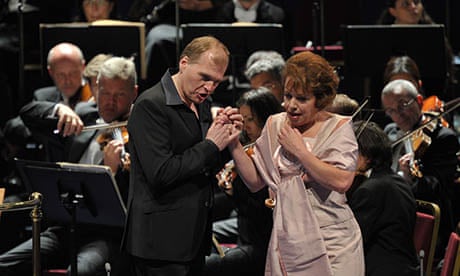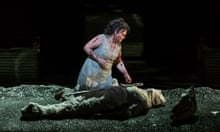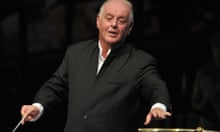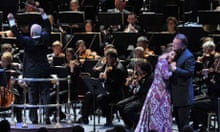Three days have passed since we left Brünnhilde on a mountain-top, fast asleep in a circle of fire. In that time, two miracles have happened. The first is that Siegfried, a mere twinkle in his mother's eye on Tuesday, is now a strapping lad with a fearless heart and growing pains. The other is that the music of the first two operas in Wagner's Ring Cycle (Das Rheingold and Die Walküre) has had time to marinate in me, and the experience of last night's Siegfried at the BBC Proms was all the richer, more flavoursome for it.
Wagner's music is really beginning to get under my skin. It's doing it in a way I'm not used to. Most music, after a while, worms in through the ear and lodges there, unabashed; but this (leitmotifs aside) is not music I can sing back to you. In fact, I can't remember much about the first two operas at all. Instead, it's seeped into me - the way an infant learns a language - so that certain moments in the musical drama have an inexplicable resonance. It's a bodily, felt sense, rather than an intellectual knowing or a light-bulb of recognition. I'm amazed that a musical language so dependent on the leitmotif (which is, to all intents and purposes, an earworm) should work such subtle magic.
Siegfried, our hero, is far from subtle. He is the teenager from hell, and although he realises quickly that he's adopted, it's clear to us where he picked up his attitude. Orphaned son of the twin-lovers Siegmund and Sieglinde, he has been raised by Mime the Nibelung, a grumpy dwarf who whacks his anvil a lot (not a euphemism), and complains bitterly about his ungrateful "son". Their long domestic argument in Act I left me cold: Siegfried is being a right pain, and Mime (exceptionally sung and acted by Wagnerian stalwart Peter Bronder) has no redeeming feature besides comic timing.
Acts II and III, however, swept me away. Siegfried begins to show his true colours as a child of nature, a blonde Mowgli whose friends are the woodland birds and creatures of the forest. His pastoral simplicity would be mawkish if not for the wondrous transformation of the orchestra into a soft, bright summer's day. Lance Ryan played the anti-intellectual hero to great comic effect, clambering through the orchestra to make fun of the cor anglais as it imitated his own reed pipe, and even dropping a one-liner in English to the horn (much to the consternation of Wagner purists, who gave a collective shudder. Well, I quite liked it, but then you know how I feel about purists…)
I won't go too far into the plot (which is pretty silly), but let's just say Siegfried, like all good teenagers, has learned to ignore advice and trust only his intuition. He re-forges his father's sword, slays a dragon, kills Mime, and heads off to rescue Brünnhilde. Meanwhile, we re-encounter characters we'd left behind in Das Rheingold: Alberich (Nibelung who stole the Rhinemaiden's gold), Wotan (leader of the gods, who appears in the guise of a Wanderer, roaming the earth in a wide-brimmed hat), and Erda (the earth-goddess of primordial wisdom who doesn't like being woken up). The fact that we know who they are, and have absorbed their back-stories, makes the whole opera make sense. I get now why Wagner bothered with the exposition of Rheingold at all, and I'm suddenly glad I sat through all two hours 40 minutes of it without a loo break.
Earlier in the day, Paul Mason told me that for him, the Ring is really Brünnhilde's story. I see what he means; she's a rich, complex character. In the final scene of Act III, as she recovers from the kiss of her beloved Siegfried (who also, by the way, happens to be her nephew), she realises that he has removed her armour, destroying her Valkyrie power for good. Her love is tinged with sadness, but their music is pure rapture, and Nina Stemme was magisterial in the role.
But for me, Wotan is the still the most compelling character. There is a deep, poignant melancholy to him, a god on the wane who tries repeatedly to put things right, only to lose the people he loves. He's been sung by a different baritone every night, and each one has coloured his heartache and pride differently, lending yet more weight to the role. After Tuesday's fireworks from Bryn Terfel, Terje Stensvold held last night's audience with the gravity of an elder statesman, and after devastating confrontations with his ex-wife Erda and his grandson Siegfried, he slipped off quietly into the twilight. The last light will go out on the world on Sunday. I'm not sure I'll be ready.
See also
I admit it: I'm a Ring-cycle virgin
One down three to go
Day two: I am hooked






Comments (…)
Sign in or create your Guardian account to join the discussion